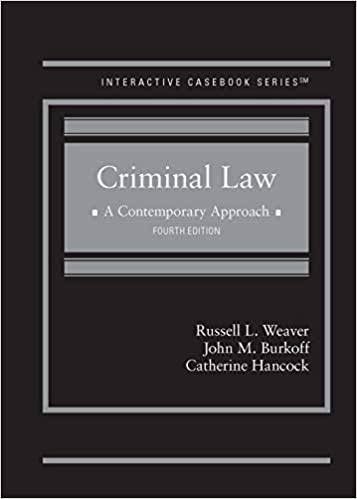Question
please see the following two separate paragraphs and come up with questions / about whether you agree or disagree with the statement why or why
please see the following two separate paragraphs and come up with questions / about whether you agree or disagree with the statement why or why not
1. One can make a strong argument for either Friedrich of Finer, but I believe a stronger argument can be made for Finer's position. While we have learned that discretion is necessary for public administrators, as Friedrich thoroughly explained, we have also learned via the Christensen article that public administration is an embodiment of its political nature and that public administrators need to be cognizant of the political aspects as they perform their constitutional duties. Finer's points include the political responsiveness element as elected officials are held accountable by the public. Finer explained in democratic governance, there are a set of controls, such as "law courts, the procedure of criticism, question, debate and fact-finding, parliamentary control of the purse within the assembly" and elections, in place to secure the "continuing responsiveness of the official" (p. 449). Because of the accountability that the public provides on elected officials, Finer's approach suggested that politicians may interfere as an external pressure to mandate and regulate the ethical behavior of public administrators to eliminate corruption. Finer's premise was that the will of the people and their experiences should not be ignored when factoring in administrative rules or ethical codes of conduct. In addition, one aspect of Finer's argument that resonated with me was that responsibility and duty was not just a personal matter, but an interpersonal one as well. Because public administrators serve the public and their interests, an interpersonal framework to guide a public administrator's responsibility needs to be considered. In contrast, Friedrich's approach prioritized the discretion granted to public administrators because they are technical experts in the particular area that they are enforcing and executing the law. Because of election turnover, Friedrich argued that bureaucrats and public managers should be tasked with administrative decision-making, while elected officials should prioritize policy making and should not interfere with how laws are implemented.
The ASPA code of ethics integrates approaches from both Friedrich and Finer, but I think it reflects more of Friedrich's approach. Notably, it promotes Friedrich's approach by including a section to demonstrate personal integrity, which suggests that public responsibility could be elicited from within. In addition, the code of ethics highlights the important role of discretion, outlining that public administrators should "exercise discretionary authority to promote the public interest." Finer's approach is evident as the code of ethics explained that public managers must understand the constitutional framework, which alludes to the separation of powers that Finer mentioned.
2. Carl Friedrich and Herman Finer offer contrasting opinions regarding the role of politicians and public/civil servants in public administration. Finer's fundamental contradiction with Friedrich's opinions lay in his distinction of responsibility as "an arrangement of correction and punishment even up to dismissal both of politicians and officials," while Friedrich believes in "reliance upon responsibility as a sense of responsibility, largely unsanctioned, except by deference or loyalty to professional standards" (7). Finer believes that servants of the public are not to decide their own course of action, but instead they are to serve others through their responsibility to serve those elected to represent public opinion. He believes those elected to represent the public opinion are most logically and holistically informed on what is feasible and what is crucial to tackle. This structure is conducive to the general and fundamental principles of what democracy is all about. Whereas Friedrich believes that ill-defined policy is conducive to irresponsible public behavior and faulty legislation, and that instead local public officials are more equipped with responsiveness tools that allow them to tackle specific challenges that arise within our communities. I tend to agree with Finer, in a sense that these are what the fundamental principles of democracy stand for.
The ASPA's most fundamental code of ethics refers to the commitment to ensure ethical practice by public servants. Its general goal is to "advocate strong, effective, and ethical public governance." In order to advance the public's interest, uphold constitutional adherence to the law, promote democratic participation, and strengthen social equity, administrators should faithfully adhere to the decisions that politicians have arrived at based on the desires of the people that they serve. In that case, I believe the ASPA's fundamental principles align more closely with that of Finer.
Step by Step Solution
There are 3 Steps involved in it
Step: 1

Get Instant Access to Expert-Tailored Solutions
See step-by-step solutions with expert insights and AI powered tools for academic success
Step: 2

Step: 3

Ace Your Homework with AI
Get the answers you need in no time with our AI-driven, step-by-step assistance
Get Started


